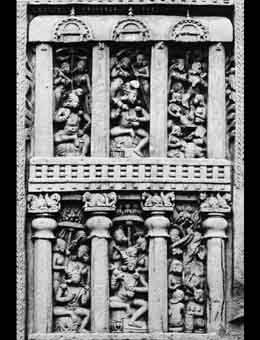|
 |
| ==1940==
In
December, Dr. Ambedkar published the first edition of
his *"Thoughts on Pakistan"*. In this
work he argued that though partition would be an
unfortunate thing, it wouldn't be the worst possible
outcome, and if the Muslims wanted it they had a perfect
right to claim it. |
 |
| ==1942==
He
founded his second political party, the All-India
Scheduled Castes Federation, which didn't do so well in
the elections of 1946. (--*Kadam*, p.115) |
 |
| ==1942==
Dr.
Ambedkar was inducted into the Viceroy's Executive
Council as Labour Member, a position which he held until
his resignation in June 1946. His thoughtful comments in
that forum cover *various topics* (see #6.). (--*Kadam*,
p.115) |
 |
| ==1942==
Congress
started the "Quit India" movement (discussion: *Abul Kalam Azad*; *Gandhi's original draft resolution*;
*Sir Stafford Cripps's reply*; *The Hindu, August 1942*; *Manas*). Dr. Ambedkar severely
criticized this move. He described it as "both
irresponsible and insane, a bankruptcy of statesmanship
and a measure to retrieve the Congress prestige that had
gone down since the war started. It would be madness, he
said, to weaken law and order art a time when the
barbarians were at the gates." (--*Keer*, p. 354.) |
 |
| ==1943==
On
January 19th he delivered the Presidential Address on
the occasion of the 101st birth anniversary of Justice
Mahadev Govind Ranade. It was published in book form in
April, under the title *"Ranade,
Gandhi,
and Jinnah"*. |
 |
| ==1943==
In
September he also prepared and published the vigorous
memorandum, *"Mr. Gandhi and the Emancipation of the
Untouchables"*. |
 |
| ==1944==
On
January 29th, he presided over the second meeting of the
Scheduled Caste Federation, in Kanpur; here is a report,
sixty years later, by *Maren Bellwinkel-Schempp*. |
 |
| ==1945==
In
February, he published a revised version of "Thoughts on
Pakistan"; this second, expanded edition was called *"Pakistan; or Partition of India"*.
A third edition of this book was published in 1946. |
 |
| ==1945==
On
May 6th he addressed the Annual Conference of the All
India Scheduled Caste Federation, held at Parel, Bombay.
This speech was soon published as *"The Communal Deadlock and a Way to
Solve It"*. |
 |
| ==1945==
In
June, he published a political manifesto detailing the
problems of dealing with Congress, and accusing it of
many acts of betrayal: *"What Congress and Gandhi Have Done to
the Untouchables"*. The next year, he published a
second edition, with *major revisions in one chapter*. |
 |
| ==1946==
In
June, he founded Siddharth College, in Bombay; it was a
project of the People's Education Society, which he had
founded in 1945. (--*Kadam*, pp. 116-17) Meanwhile, Gandhi made it clear
that he did not have any use for such "graduates": *"Left-handed Compliment"* [--text
courtesy of Joel Lee]. |
 |
| ==1946==
In
July, he exchanged letters with W. E. B. DuBois, comparing
Untouchables with black Americans [site]. In October, he published *"Who Were the Shudras? How They Came to
Be the Fourth Varna in the Indo-Aryan Society"*.
He dedicated the book to the great early reformer Jotiba
Phule (*site*). |
 |
| ==1946==
On
December 17th, he gave a memorable *address to the Constituent Assembly*. |
 |
| ==1947==
In
March he published *"States and Minorities: What Are their
Rights and How to Secure them in the Constitution of
Free India"*, a memorandum on fundamental rights,
minority rights, safeguards for the Depressed Classes,
and the problems of Indian states. |
 |
| ==1947==
INDEPENDENCE
and Partitioncame in August; Dr. Ambedkar accepted
Nehru's invitation to become Minister of Law in the
first Cabinet of independent India. On August 29th he
was appointed Chairman of the Drafting Committee for the
new Constitution. |
 |
| ==1948==
In
the last week of February, the Draft Constitution was
submitted for public discussion and debate: *Constitutional discussions and debates*
(see #7). |
 |
| ==1948==
On
April 15th, Dr. Ambedkar married Dr. Sharda Kabir (a
Saraswat Brahmin) in Delhi; she adopted the name Savita.
He was now diabetic and increasingly ill, and she took
care of him for the rest of his life. |
 |
| ==1948==
In
October, he prepared a memorandum on *"Maharashtra as a Linguistic Province"*,
expressing his views for submission to the Linguistic
Provinces Commission. |
 |
| ==1948==
He
published *"The Untouchables: a Thesis on the
Origin of Untouchability"*(New Delhi: Amrit Book
Company), as a sequel to his book on the Shudras. As
always on this subject, he wrote with passion. In the
Preface he said, "The Hindu Civilisation.... is a
diabolical contrivance to suppress and enslave humanity.
Its proper name would be infamy. What else can be said
of a civilisation which has produced a mass of people...
who are treated as an entity beyond human intercourse
and whose mere touch is enough to cause pollution?" |
 |
| ==1948==
In
November, the Draft *Constitution* with its 315
articles and 8 schedules was formally introduced to the
Constituent Assembly. Dr. Ambedkar concluded his speech:
"I feel that the Constitution is workable; it is
flexible and it is strong enough to hold the country
together both in peace time and in war time. Indeed, if
I may say so, if things go wrong under the new
Constitution the reason will not be that we had a bad
Constitution. What we will have to say is that Man was
vile." (--*Keer*,
p.410.) |
 |
| ==1949==
In
November, the Constituent Assembly adopted the
Constitution, including Article 17, which formally
abolished untouchability. |
 |
| == on to the 1950's == |
|
